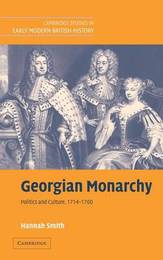
|
Georgian Monarchy: Politics and Culture, 1714-1760
Hardback
Main Details
| Title |
Georgian Monarchy: Politics and Culture, 1714-1760
|
| Authors and Contributors |
By (author) Hannah Smith
|
| Series | Cambridge Studies in Early Modern British History |
|---|
| Physical Properties |
| Format:Hardback | | Pages:316 | | Dimensions(mm): Height 229,Width 152 |
|
| ISBN/Barcode |
9780521828765
|
| Classifications | Dewey:352.23094109033 |
|---|
| Audience | | Postgraduate, Research & Scholarly | |
|---|
|
Publishing Details |
| Publisher |
Cambridge University Press
|
| Imprint |
Cambridge University Press
|
| Publication Date |
8 June 2006 |
| Publication Country |
United Kingdom
|
Description
This book, first published in 2006, is a revisionist account of the monarchy during the reigns of the first two Hanoverian kings of Britain, George I and George II. This detailed study of early Georgian kingship and queenship examines the rhetorical and iconographical fashioning of the dynasty, evaluates the political and social function of the early Georgian court, and provides an extensive analysis of provincial cultures of monarchism. Wide-ranging in the scope of its enquiry and interdisciplinary source material, it rejects the contention that the Georgian kings were tolerated solely on the grounds of political expediency. Instead, Hannah Smith argues that they enjoyed a rich popularity that grew out of a flourishing culture of loyalism. In doing so, she engages with key debates over the nature of early eighteenth-century British society, highlights the European context to British political thinking, and, more broadly, illuminates the functioning of cultures of power in this period.
Author Biography
Hannah Smith is Director of Studies and College Lecturer in History at Christ's College, Cambridge.
Reviews'In this wide-ranging, archivally well-grounded, and interesting volume, Dr Smith ... joins the lists of those offering revisionist accounts of the reigns of George I and George II ...' Archives ' ... its general thrust carries conviction and has broader implications for historians of eighteenth-century Britain.' History
|